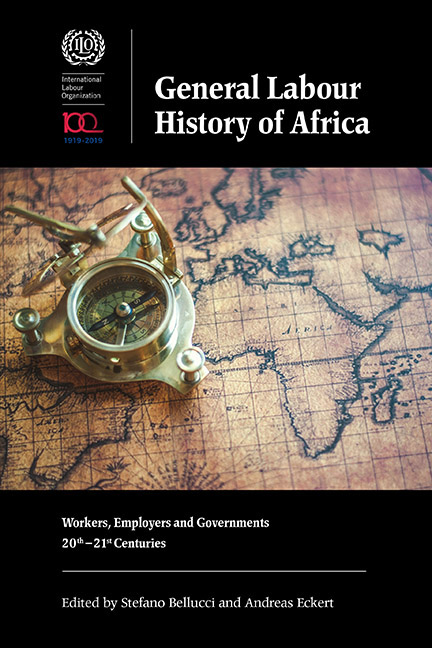Book contents
- Frontmatter
- Contents
- List of Maps and Figures
- List of Tables
- Notes on Contributors
- Foreword
- Acknowledgements
- The ‘Labour Question’ in Africanist Historiography
- Part I Free and Unfree Labour
- Part II Key Sectors
- Part III International Dimensions and Mobility
- Part IV Varieties of Work
- Part V Entrepreneurs and Self-Employment
- 15 Capitalists and Labour in Africa
- 16 Entrepreneurial Labour
- 17 Professionals and Executives
- Part VI The State, Unions and Welfare
- Part VII Conclusions
- Select Bibliography
- Index
15 - Capitalists and Labour in Africa
from Part V - Entrepreneurs and Self-Employment
Published online by Cambridge University Press: 21 September 2019
- Frontmatter
- Contents
- List of Maps and Figures
- List of Tables
- Notes on Contributors
- Foreword
- Acknowledgements
- The ‘Labour Question’ in Africanist Historiography
- Part I Free and Unfree Labour
- Part II Key Sectors
- Part III International Dimensions and Mobility
- Part IV Varieties of Work
- Part V Entrepreneurs and Self-Employment
- 15 Capitalists and Labour in Africa
- 16 Entrepreneurial Labour
- 17 Professionals and Executives
- Part VI The State, Unions and Welfare
- Part VII Conclusions
- Select Bibliography
- Index
Summary
A volume focused on workers’ problems and experiences would be incomplete without a chapter that approaches the relations between labour and capital by exploring how capitalists sought to manage their relationships with workers, thereby affecting the latter's experiences in the labour market and the workplace. Thus, this chapter discusses the changing nature of ‘the labour problem’ as understood and reacted to by masters and employers in the twentieth and early twenty-first centuries. In turn, any analysis of capital– labour relations, especially in economies in which much of the population was – and remains, albeit to a steadily diminishing extent – primarily engaged in agriculture, needs to take account of the availability of natural resources, especially cultivable land and economically useful minerals. The argument here focuses upon the uneven and incomplete transition from a general abundance of land in relation to labour at the beginning of the colonial occupation of most of Africa (1879–c. 1900), to the early twenty-firstcentury situation of increasingly widespread shortages of land and relative abundance of labour in large parts of the continent. It must be said that the notion of this incomplete transition is much more salient south rather than north of the Sahara. It is of particularly little relevance to the most populous country of North Africa, Egypt, where population densities in its arable zone were already relatively high long before the twentieth century. So, while the discussion below is framed in continental terms, the focus will be on sub-Saharan Africa.
‘Capitalists’ are understood here as owners and managers of capital. The term overlaps with ‘entrepreneurs’, in the sense of those who bring the factors of production (labour, land and capital) together. But not all entrepreneurs in Africa are capitalists, unless the latter term is overstretched to include family farmers and lone market stallholders, among others. Besides its definition as a role or structural position, entrepreneurship is also often defined as an attitude towards investment: one of taking the long view and willingly accepting risk. Again, not all capitalists in Africa or anywhere else are entrepreneurial in attitude, nor is such an attitude confined to owners of capital, though having capital to invest creates the opportunity to display or develop such an orientation.
- Type
- Chapter
- Information
- General Labour History of AfricaWorkers, Employers and Governments, 20th-21st Centuries, pp. 425 - 456Publisher: Boydell & BrewerPrint publication year: 2019



